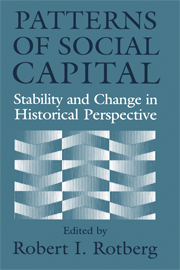
- Cited by 6
-
Cited byCrossref Citations
This Book has been cited by the following publications. This list is generated based on data provided by Crossref.
Kern, Kristine 2004. Zivilgesellschaft und Sozialkapital. p. 109.
Jessen, Ralph and Reichardt, Sven 2004. Zivilgesellschaft als Geschichte. p. 7.
Patulny, Roger V. and Lind Haase Svendsen, Gunnar 2007. Exploring the social capital grid: bonding, bridging, qualitative, quantitative. International Journal of Sociology and Social Policy, Vol. 27, Issue. 1/2, p. 32.
Kucukcan, Talip 2008. Religion, Politics, and Turkey’s EU Accession. p. 199.
Laird, Pamela Walker 2008. Putting social capital to work. Business History, Vol. 50, Issue. 6, p. 685.
Dias Pereira, Joana 2018. Resilient alliances: portuguese cooperative movement in the transition to modern times (1867-1933). REVESCO. Revista de Estudios Cooperativos, Vol. 128, Issue. , p. 59.
- Publisher:
- Cambridge University Press
- Online publication date:
- April 2010
- Print publication year:
- 2000
- Online ISBN:
- 9780511572777
- Subjects:
- History, Regional History after 1500


